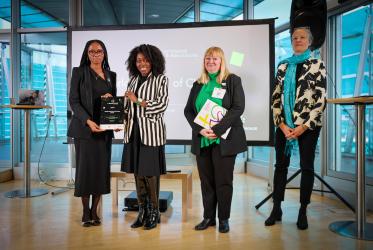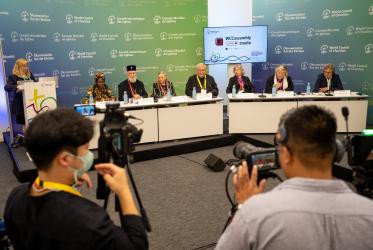Today is a travel day for me, journeying from Stuttgart, where many thousands of Protestants from all over Germany along with many fellow believers from other confessions and countries had gathered for a four-day festival of faith and action, to the venue of the European Christian Internet Conference in Helsinki, Finland. Being offline for a few hours of travel time is an opportunity to think about my work and how it contributes to the Pilgrimage of Justice and Peace.
When the delegates of the World Council of Churches’ 345 member churches gathered in the Korean harbour city of Busan in 2013, they issued a call to all Christians and people of good will to engage in this “pilgrimage of justice and peace”. But how is it possible for the world’s two billion Christians, plus partners of other beliefs, to go on such a pilgrimage together?
Of course this pilgrimage is not one that takes all of us to one specific place on Earth. Rather, it is about letting ourselves be moved, together, to become witnesses of God’s will for justice and peace.
While some will really set out on foot, relying on the old wisdom that our heads work better when our legs are moving, others will find other ways of moving the pilgrimage forward together.
There is a German song that says: Many little people in many little places taking many little steps can change the face of the Earth.
However, it is often hard to see these changes while close up. It can be hard for us “many little people” to stay on track when we only see our own “little place”. That is why, in the World Council of Churches’ communication department, we are encouraging people to share their stories and offering tools, including this blog as well as the resource website wccpilgrimage.org, that help share ideas, experiences and concerns among fellow pilgrims all over the world.
Personal encounters are an important motivation for the Pilgrimage of Justice and Peace. I experienced this at the German Protestant Kirchentag in Stuttgart last week. Having grown up in the region, I was able to welcome family and friends at the WCC booth at this event and tell them what we do. I also met “fellow pilgrims” from as far away as Syria and Zimbabwe.
Meeting online in social media and discussion platforms cannot replace such personal encounters. Nonetheless, the internet can be a space where we enter into contact with people we would never get to talk to otherwise. It can help us stay in touch beyond borders after an all-to-short first meeting. And when we come face-to-face with someone we’ve already got to know online, we can begin our offline conversation at a deeper level right away.
Sometimes, electronic media are dismissed for not being serious enough. It is true that they tend to be playful, blurring the line between duty and fun. But is that all bad?
The topic for the European Christian Internet Conference this year is: “Let us play! Gamification, Storytelling and Faith”. Gamification means using elements of games – such as symbolic rewards, quizzes, nice graphics that make progress more visual, engaging storylines that put the “player” at the centre of the action, etc. – in order to motivate people to participate in “serious” activities or to fulfil certain tasks more diligently, in the workplace and beyond.
Churches, like other institutions, are discovering that a certain playfulness can strengthen our Christian fellowship and our commitment to our calling.
The reason that human beings, just like many of our four-legged fellow creatures, enjoy to play is that it helps us train our senses and learn new skills. In our day and age, not only children need to learn constantly but adults, too.
The theme of the Kirchentag which ended yesterday was "That we may become wise" (Ps 90:12). Being playful like children may be a way of keeping our heart and minds open to new learnings, moving us closer to God’s wisdom.







